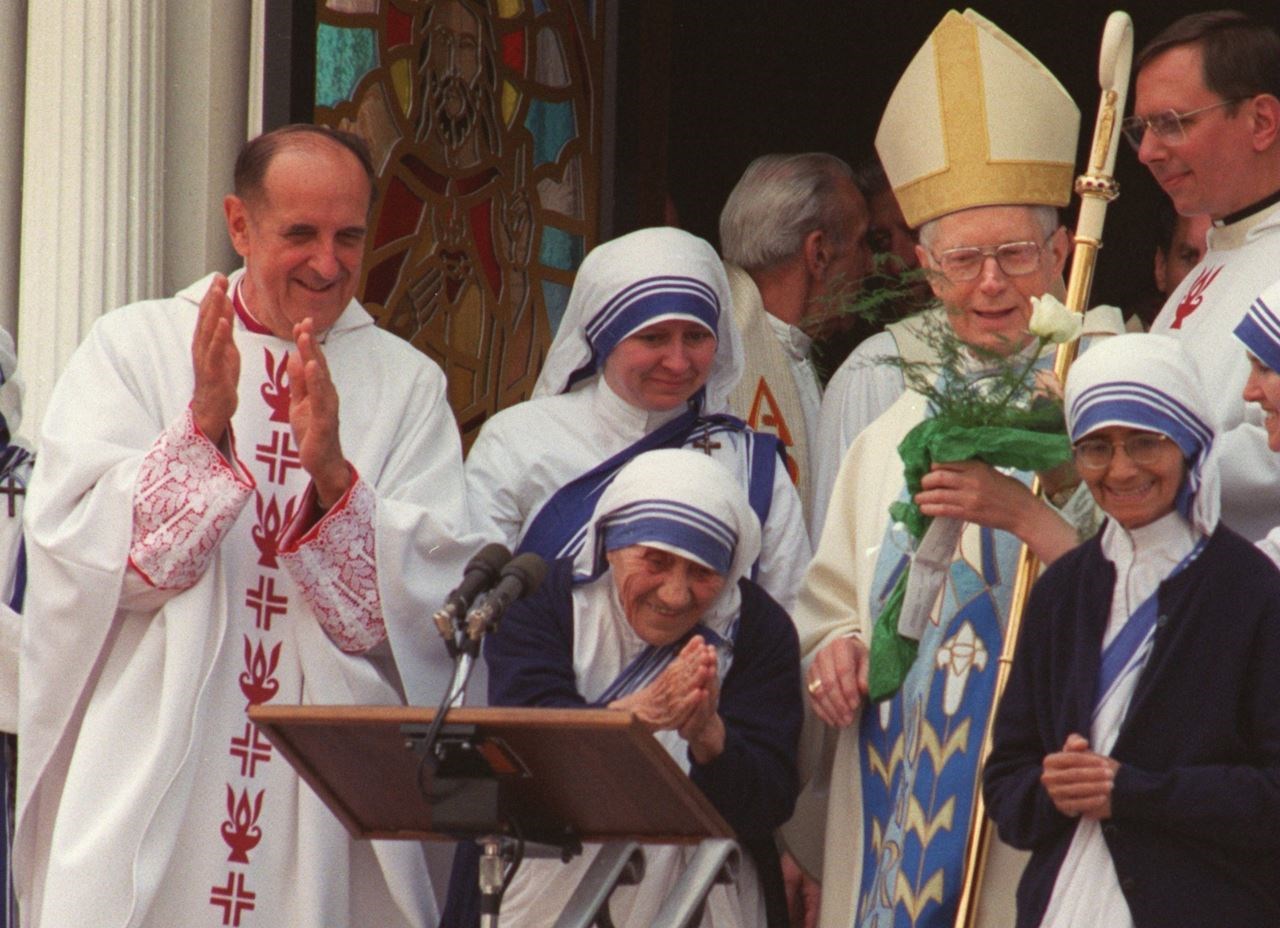 A portrait picture of Mother Teresa.https://signum.se/indier-forsvarar-moder-teresa-mot-hinduledares-anklagelser/“To begin a redefinition of the American hero—as we do in this issue—is an act of will that says that whatever else we may actually be, it's to this that we aspire. And as long as we need examples of how to live, as long as we aspire, we will never be too old for heroes” (Granger). In the article, "Boy, Do We Ever Need a Hero," David Granger establishes that as society continues to evolve, heroes will always be relevant to exemplify the rules of life. As the world advances, people start to crave something or someone they can rely on. Most of the time, human heroes are the way to go. Human heroes possess the strong desire to benefit others and possess the virtues of determination and persistence that people can not have every day by rising above social adversities. A hero’s steadfastness towards their contributions to the world makes them stand out from the crowd. Since human heroes hold onto the traits of determination and selflessness, they are the shoulders people tend lean on when the society starts to adapt fast. Personally, I look for a hero that acquires a strong mind set to achieve the tenacious goal of helping others. A hero should have the ability to avoid misfortunes that can potentially block their pathway to success. However, their determination to impact lives with their diligence and their perseverance through difficulties to accomplish an achievement with the sole purpose of a better society makes up what heroism is known for today.
A portrait picture of Mother Teresa.https://signum.se/indier-forsvarar-moder-teresa-mot-hinduledares-anklagelser/“To begin a redefinition of the American hero—as we do in this issue—is an act of will that says that whatever else we may actually be, it's to this that we aspire. And as long as we need examples of how to live, as long as we aspire, we will never be too old for heroes” (Granger). In the article, "Boy, Do We Ever Need a Hero," David Granger establishes that as society continues to evolve, heroes will always be relevant to exemplify the rules of life. As the world advances, people start to crave something or someone they can rely on. Most of the time, human heroes are the way to go. Human heroes possess the strong desire to benefit others and possess the virtues of determination and persistence that people can not have every day by rising above social adversities. A hero’s steadfastness towards their contributions to the world makes them stand out from the crowd. Since human heroes hold onto the traits of determination and selflessness, they are the shoulders people tend lean on when the society starts to adapt fast. Personally, I look for a hero that acquires a strong mind set to achieve the tenacious goal of helping others. A hero should have the ability to avoid misfortunes that can potentially block their pathway to success. However, their determination to impact lives with their diligence and their perseverance through difficulties to accomplish an achievement with the sole purpose of a better society makes up what heroism is known for today.
 Mother Teresa and her journey in Catholicismhttps://www.mcall.com/news/local/mc-mother-teresa-sunday-story-20160903-story.htmlOne of the most well-known and iconic philanthropists, Mother Teresa, illustrated the definition of heroism through her strength to surmount over adversities by being focused on her benevolent works. Surprisingly, she did not start her goal to assist the poor in a rich neighborhood, but started in Shkup, Albania. Mother Teresa felt a calling from God, instructing her to give up what she had for the poor. She believed that they needed her assistance to guide them out of poverty. By the 1950’s, she had created a missionary called the Missionaries of Charity and began to travel all around the world. Although Mother Teresa knew her goal to help everyone she could was going to be her toughest challenge, she was desperate and gave her best effort in all her works. In 1979, her charity works lead her to win the Nobel Peace Prize. Unfortunately, she passed away September 5, 1997, in Calcutta, India. Although Mother Teresa was not alive, she was still pronounced as a saint on September 4, 2016. Past her death, her works have touched hearts and continued to do so today. Mother Teresa’s actions, such as her determination to keep her charity work first priority, perseverance against society’s denunciation, and her sacrifice of materials for the sake of the poor give her the rights to receive admiration from others. Not only did Mother Teresa reflect the idea of a modern hero by channeling her dedication towards the impoverished through her philanthropic works, but she also stuck to her values in spite of pressure and criticism.
Mother Teresa and her journey in Catholicismhttps://www.mcall.com/news/local/mc-mother-teresa-sunday-story-20160903-story.htmlOne of the most well-known and iconic philanthropists, Mother Teresa, illustrated the definition of heroism through her strength to surmount over adversities by being focused on her benevolent works. Surprisingly, she did not start her goal to assist the poor in a rich neighborhood, but started in Shkup, Albania. Mother Teresa felt a calling from God, instructing her to give up what she had for the poor. She believed that they needed her assistance to guide them out of poverty. By the 1950’s, she had created a missionary called the Missionaries of Charity and began to travel all around the world. Although Mother Teresa knew her goal to help everyone she could was going to be her toughest challenge, she was desperate and gave her best effort in all her works. In 1979, her charity works lead her to win the Nobel Peace Prize. Unfortunately, she passed away September 5, 1997, in Calcutta, India. Although Mother Teresa was not alive, she was still pronounced as a saint on September 4, 2016. Past her death, her works have touched hearts and continued to do so today. Mother Teresa’s actions, such as her determination to keep her charity work first priority, perseverance against society’s denunciation, and her sacrifice of materials for the sake of the poor give her the rights to receive admiration from others. Not only did Mother Teresa reflect the idea of a modern hero by channeling her dedication towards the impoverished through her philanthropic works, but she also stuck to her values in spite of pressure and criticism.
 Mother Teresa and the poor. https://www.takepart.com/article/2015/11/23/mother-teresa-legacy-humanitarian/Mother Teresa inspired others to persist in their goals by displaying the power of determination through her goal of achieving philanthropic works and her success that followed. Since she never had the proper materials to teach in Calcutta, she decided to try her lessons without any source of materials: “By Christmas of 1948, she was back in Calcutta, living with the Little Sisters of the Poor while teaching basic literacy and elementary hygiene to poor children in the streets. The ground was her blackboard, a stick was her chalk” (“Teresa of Calcutta, Mother”). Even though she was given no resources to help educate the poor, Mother Teresa did not give up. Instead, she acknowledged the lack of materials for her lesson and proceeded to teach with the objects around her. Her mind set to not let a small disadvantage stop her from wanting to accomplish her goal of assisting the indigent illustrated her steadfastness. Another example of her determination was when Mother Teresa calmly answered one reporter’s question about why she continued her work with the poor when it seemed insignificant compared to how big the issue of poverty was: “Well, I never thought I would be able to change the world! I have only tried to be a drop of clean water in which God's love could sparkle. Does that seem little?” (Comastri). In other words, Mother Teresa did good works because she was strong-willed to do the most with her ability. Also, she strived to help people in need by spreading the message of how big God’s love was for everyone. Mother Teresa’s determination to spread goodness with a limit shows how the quality of how helping others is more significant than gaining quantity of recognition. Mother Teresa affirmed that ambition can be accomplished with determination.
Mother Teresa and the poor. https://www.takepart.com/article/2015/11/23/mother-teresa-legacy-humanitarian/Mother Teresa inspired others to persist in their goals by displaying the power of determination through her goal of achieving philanthropic works and her success that followed. Since she never had the proper materials to teach in Calcutta, she decided to try her lessons without any source of materials: “By Christmas of 1948, she was back in Calcutta, living with the Little Sisters of the Poor while teaching basic literacy and elementary hygiene to poor children in the streets. The ground was her blackboard, a stick was her chalk” (“Teresa of Calcutta, Mother”). Even though she was given no resources to help educate the poor, Mother Teresa did not give up. Instead, she acknowledged the lack of materials for her lesson and proceeded to teach with the objects around her. Her mind set to not let a small disadvantage stop her from wanting to accomplish her goal of assisting the indigent illustrated her steadfastness. Another example of her determination was when Mother Teresa calmly answered one reporter’s question about why she continued her work with the poor when it seemed insignificant compared to how big the issue of poverty was: “Well, I never thought I would be able to change the world! I have only tried to be a drop of clean water in which God's love could sparkle. Does that seem little?” (Comastri). In other words, Mother Teresa did good works because she was strong-willed to do the most with her ability. Also, she strived to help people in need by spreading the message of how big God’s love was for everyone. Mother Teresa’s determination to spread goodness with a limit shows how the quality of how helping others is more significant than gaining quantity of recognition. Mother Teresa affirmed that ambition can be accomplished with determination.
 Mother Teresa praying the rosary.https://www.slate.com/articles/news_and_politics/fighting_words/2003/10/mommie_dearest.htmlIn addition, her perseverance in staying true to her values displays that individual judgement should come before the general position. She believed that her job was to spread love to the penurious for God. Mother Teresa explained that her works for the poor did not need political judgment: “Indeed, in later interviews Mother Teresa continued to strike an apolitical pose, refusing to take a stand on anything other than strictly religious matters…. The business given by God to her and her group was simply serving the very poor with as much love and skill as they could muster” (“Mother Teresa”). Simply put, Mother Teresa reasoned that political views were not part of her religious order. Her viewpoint against politics encouraged others that personal values and beliefs should be placed above social relation. Not only did Mother Teresa avoid pressure from politics, but also avoided criticism from people who believed that abortion should be legal. Instead of letting the criticism get to the best of her, she decided to explain her opinions: “Her consistent opposition to abortion and capital punishment has brought criticism from some quarters. 'Life belongs to God,' she insists, 'and we haven't the right to destroy it'" (“Teresa of Calcutta, Mother”). While others thought abortion was not an issue, Mother Teresa elucidated God’s purpose of life. She received criticism from people who did not understand the significance of life. Mother Teresa’s strong passion to keep her promise with God empowers others to fight for their opinions against society’s rules. Mother Teresa pursued through adversities by setting a strong mind set towards her beliefs.
Mother Teresa praying the rosary.https://www.slate.com/articles/news_and_politics/fighting_words/2003/10/mommie_dearest.htmlIn addition, her perseverance in staying true to her values displays that individual judgement should come before the general position. She believed that her job was to spread love to the penurious for God. Mother Teresa explained that her works for the poor did not need political judgment: “Indeed, in later interviews Mother Teresa continued to strike an apolitical pose, refusing to take a stand on anything other than strictly religious matters…. The business given by God to her and her group was simply serving the very poor with as much love and skill as they could muster” (“Mother Teresa”). Simply put, Mother Teresa reasoned that political views were not part of her religious order. Her viewpoint against politics encouraged others that personal values and beliefs should be placed above social relation. Not only did Mother Teresa avoid pressure from politics, but also avoided criticism from people who believed that abortion should be legal. Instead of letting the criticism get to the best of her, she decided to explain her opinions: “Her consistent opposition to abortion and capital punishment has brought criticism from some quarters. 'Life belongs to God,' she insists, 'and we haven't the right to destroy it'" (“Teresa of Calcutta, Mother”). While others thought abortion was not an issue, Mother Teresa elucidated God’s purpose of life. She received criticism from people who did not understand the significance of life. Mother Teresa’s strong passion to keep her promise with God empowers others to fight for their opinions against society’s rules. Mother Teresa pursued through adversities by setting a strong mind set towards her beliefs.
 A picture of Mother Teresa praying.https://www.abc.net.au/news/2016-09-04/how-to-become-a-saint-like-mother-teresa/7804580Mother Teresa embodies the definition of a worthy hero because of her desires to assist the poor with her charity work and her commitment to her values. Mother Teresa’s contributions towards educating the poor without materials and aiming to assist the ones she could reach to demonstrate her ambitious attitude. She kept her values first and persisted through people who criticized and pressured her opinions in attempt to break her promise with God. In Mother Teresa’s Nobel Peace Prize Acceptance Speech, she reveals the hidden poverty in the poor: “Our poor people are great people, are very lovable people, they don't need our pity and sympathy, they need our understanding love. They need our respect; they need that we treat them with dignity. And I think this is the greatest poverty that we experience, that we have in front of them who may be dying for a piece of bread, but they die to such dignity” (Mother Teresa). Mother Teresa enlightens the powerful truth about the lack of self-regard poor people go through and how we should recognize them. Mother Teresa’s compassion for serving the poor motivates us to have a desire to change an issue in the world like she changes the view of the poor in society and their need for love. Personally, Mother Teresa’s commitment to God inspires me to mirror her works, such as donating to charities and teaching the poor. I have been feeding the homeless every year with the Catholic charities in order to create a change for at least one person struggling. Mother Teresa encouraged me to keep my faith strong with God and to trust his unconditional love. Her contributions to the world and her kindness towards the poor is the reason why I made my confirmation name to Teresa. Mother Teresa’s continuous dedication to serve the poor, in spite of criticism and pressure thrown at her, unveils that she is the difference we need in this society. Mother Teresa’s preconception towards the value of life was exposed during an interview when the interviewer mentioned that attempting to save the poor was helpless: “He realized that Mother Teresa had virtually no understanding of a cynical or godless point of view that could consider any human being less than absolutely valuable” (“Mother Teresa”). Mother Teresa did not comprehend the idea of someone’s life being less important than anyone else’s. She truly believed God gave every person a meaningful purpose in the world. She reminds the world to assist anyone in need through God’s love no matter how big or how small the impact will be. As long as Mother Teresa embodies the true value of fortitude towards altruism, she will never be too old to exemplify the definition of a worthy hero.
A picture of Mother Teresa praying.https://www.abc.net.au/news/2016-09-04/how-to-become-a-saint-like-mother-teresa/7804580Mother Teresa embodies the definition of a worthy hero because of her desires to assist the poor with her charity work and her commitment to her values. Mother Teresa’s contributions towards educating the poor without materials and aiming to assist the ones she could reach to demonstrate her ambitious attitude. She kept her values first and persisted through people who criticized and pressured her opinions in attempt to break her promise with God. In Mother Teresa’s Nobel Peace Prize Acceptance Speech, she reveals the hidden poverty in the poor: “Our poor people are great people, are very lovable people, they don't need our pity and sympathy, they need our understanding love. They need our respect; they need that we treat them with dignity. And I think this is the greatest poverty that we experience, that we have in front of them who may be dying for a piece of bread, but they die to such dignity” (Mother Teresa). Mother Teresa enlightens the powerful truth about the lack of self-regard poor people go through and how we should recognize them. Mother Teresa’s compassion for serving the poor motivates us to have a desire to change an issue in the world like she changes the view of the poor in society and their need for love. Personally, Mother Teresa’s commitment to God inspires me to mirror her works, such as donating to charities and teaching the poor. I have been feeding the homeless every year with the Catholic charities in order to create a change for at least one person struggling. Mother Teresa encouraged me to keep my faith strong with God and to trust his unconditional love. Her contributions to the world and her kindness towards the poor is the reason why I made my confirmation name to Teresa. Mother Teresa’s continuous dedication to serve the poor, in spite of criticism and pressure thrown at her, unveils that she is the difference we need in this society. Mother Teresa’s preconception towards the value of life was exposed during an interview when the interviewer mentioned that attempting to save the poor was helpless: “He realized that Mother Teresa had virtually no understanding of a cynical or godless point of view that could consider any human being less than absolutely valuable” (“Mother Teresa”). Mother Teresa did not comprehend the idea of someone’s life being less important than anyone else’s. She truly believed God gave every person a meaningful purpose in the world. She reminds the world to assist anyone in need through God’s love no matter how big or how small the impact will be. As long as Mother Teresa embodies the true value of fortitude towards altruism, she will never be too old to exemplify the definition of a worthy hero.
Comastri, Angelo. “This Is How I Remember Her.” Mother Teresa: A Life Copied from the Gospel, www.motherteresa.org/mother-teresa-a-life-copied-from-the-gospel.html.
Granger, David. "Boy, Do We Ever Need a Hero." Esquire, Nov 1998. Vol. 130, number 5, p. 26.
"Mother Teresa." Encyclopedia of World Biography, Gale, 1998. Biography In Context, https://link.galegroup.com/apps/doc/K1631006438/BIC?u=powa9245&sid=BIC&xid=b14e4bbe. Accessed 5 Apr. 2018.
"Teresa Of Calcutta, Mother." Historic World Leaders, edited by Anne Commire, Gale, 1994. Biography In Context, https://link.galegroup.com/apps/doc/K1616000567/BIC?u=powa9245&sid=BIC&xid=fb3d06c0. Accessed 17 Apr. 2018.
"Transcript of Mother Teresa’s Acceptance Speech". Nobelprize.org. Nobel Media AB 2014. Web. 30 Apr 2018. https://www.nobelprize.org/nobel_prizes/peace/laureates/1979/teresa-acceptance_en.html
Page created on 5/30/2018 2:08:04 AM
Last edited 5/31/2018 6:01:59 PM
